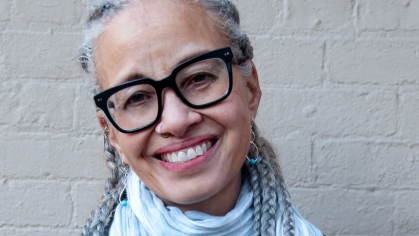Office of Continuing Education Hosts 9th Annual Challenging Racism Conference
Rutgers School of Social Work’s Office of Continuing Education hosted its ninth annual Challenging Racial Disparities Conference, “A Call to Action,” on Wednesday, June 9, bringing together more than 500 social workers and allied professionals for a powerful virtual learning opportunity. Attendees heard from thought leaders in the profession and gained new skills to address issues in their work with clients, organizations, and communities.
“Challenging systemic racism is central to the mission of social work, which is why we’ve convened this conference for nearly a decade” said Dr. Douglas Behan, Director of the Office of Continuing Education. “Each year, we bring in leading voices who share their insights and inspire our community in the ongoing work towards racial justice.”
Antoinette Y. Farmer, PhD, Professor and Associate Dean for Diversity, Equity, and Inclusion at Rutgers School of Social Work, welcomed guests to the conference, and Dr. Michael Yellow Bird presented the opening address. Dr. Yellow Bird is Dean and Professor of Social Work at the University of Manitoba. His research focuses on the effects of colonization and methods of decolonization, ancestral health, intermittent fasting, Indigenous mindfulness, neurodecolonization, mindful decolonization, and the cultural significance of Rez dogs.
Dr. Yellow Bird is the founder, director, and principal investigator of The Centre for Mindful Decolonization and Reconciliation at the University of Manitoba. He is the author of numerous scholarly articles, book chapters, research reports, and the co-editor of four books. He is an enrolled member of the Mandan, Hidatsa, and Arikara (MHA) Nation in North Dakota.
The conference keynote was delivered by Heather McGhee, JD, who designs and promotes solutions to inequality in America. An influential voice in the media and a former NBC contributor, McGhee regularly appears on NBC’s Meet the Press and MSNBC’s Morning Joe, Deadline White House, and All In.
McGhee is the chair of the board of Color Of Change, the nation’s largest online racial justice organization, and also serves on the boards of the Rockefeller Brothers Fund, the Open Society Foundations’ US Programs, and Demos. Heather is the author of the bestselling book, The Sum of Us: What Racism Costs Everyone and How We Can Prosper Together. She holds a BA in American Studies from Yale University and a JD from the University of California at Berkeley School of Law.
The event concluded with a lively panel discussion featuring Sandra Crewe, MSW, PhD, ACSW (Sojourner Truth Social & Racial Justice Visiting Professor at Rutgers School of Social Work), Mark Lamar, MSW, MBA, LCSW (Associate Professor of Professional Practice & Executive Director of the Office of Practicum Learning at Rutgers School of Social Work), Heather McGhee, JD, and Michael Yellow Bird, PhD. Chiara Sabina, PhD (Associate Professor, Chancellor’s Scholar for Inclusive Excellence in Interpersonal Violence Research & Associate Director of the Center for Research on Ending Violence at Rutgers School of Social Work) served as moderator.
“The conference reminded me why I chose to be a social worker many years ago and why I love to keep learning from others in the field and profession,” said a conference attendee. Another participant said, “This was a critically important discussion at a critically important moment. I am looking forward to putting what I am taking away from this into practice.”
The annual Challenging Racism Conference is offered in honor of Dr. William Neal Brown, a professor at the School of Social Work who passed away in 2009. Dr. Brown was the first Black professor at Rutgers. Although he taught at the School of Social Work for over thirty years, his contributions and legacy historically went unnoticed. To learn more about Dr. Brown's life and legacy, read his Oral History Archives interview through the Rutgers-New Brunswick School of Arts and Sciences.
Special thanks to Dr. Brown's longtime partner, Suzanne Zimmer, who made this support possible through her continued advocacy and contributions to the School of Social Work and Rutgers University.

